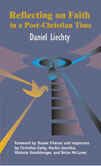Summary: As the author views it, the desire for religious and spiritual commitment remains strong in North American and European post-Christian society, although now free to take many forms both inside and outside the churches. Drawing on the anthropological work of Ernest Becker, Liechty suggests that by understanding such desire as a result of our human ability to anticipate our own death, we can see both why this urge is unquenched by modernity and make sense of the myriad pathways and channels of expression it has taken in our time. Rooted firmly in this anthropological theory of religion, Liechty then returns to examine some major teachings of the Anabaptist-Mennonite faith. He finds the foundation of Anabaptist spirituality in its historically-honed commitment to religious freedom, communal principles, and nonviolent ethics. He suggests that this spiritual foundation is particularly valuable in a post-Christian and religiously pluralistic society, representing one historically viable interpretation of the Christian religion that not only allows for but positively encourages adherents to live in an attitude of integrity, respect, and mutual acceptance with people of many different religious faith traditions. Although indebted to its first edition, published under the title Theology in Postliberal Perspective, this edition includes not only considerable updating of many chapters but also several new chapters. A notable feature is that this edition includes a chapter of extensive responses, both affirming and critical. Comment:
"Liechty’s voice struck me with an
extraordinary ring of authority . . . persuasive because
he is not shouting to persuade, instructive because he is
not pushing to instruct, delightful because he is not
striving to delight. Rather, what he is trying to do is
simply to reflect . . . his own personal musings and
readings and reasonings and intuitions." “A call for the end of theology so
as to clear space for a new kind of theological thought .
. . with strong emphasis on the priority of ethics over
dogma, of pacifist sensibilities . . . and a strong sense
of the tragic. . . . Readers should not expect old
orthodoxies in modernized dress. This is theology in a
‘post-Christian’ key. . . . Liechty writes in a
reflective, almost pastoral mood. His prose is clear and
simple; the presentation is ‘inclusive’ in
style to enable as many people as possible to read and
understand it. This is exactly what one hopes will
happen.” Market: Church leaders and pastors; students and scholars; groups or individuals interested in a thoughtful guide to religious reflection today. Shelving: Theology—Anabaptist-Mennonite, of pacifism, peacemaking; Becker, Ernest; Philosophy; Ethics. BISAC: Religion, Social Sciences. RTM: 690 Religion/Ethics, 750 Sociology. The Author: Daniel Liechty, Normal, Illinois, is a licensed clinical social worker with a background in religious issues and in hospice work. He is a member of the faculty at the School of Social Work, Illinois State University in Normal. Publisher: Cascadia
Publishing House (the new name of Pandora Press U.S.) Reflecting on Faith in a Post-Christian Time orders:
|
|||||||
| Click here to explore joining InnerCircle readers club and receiving occasional updates and special discounts. | |||||||

